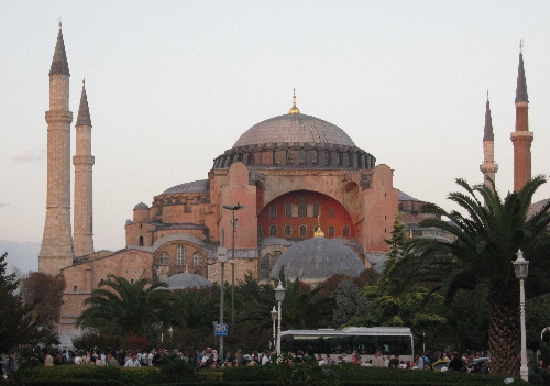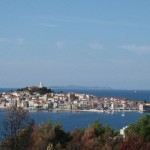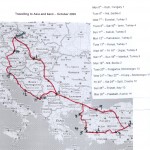
Before I continue describing and illustrating our journey back to Prague from Cappadocia in central Turkey, via Bulgaria, Serbia, Montenegro, Croatia, Bosnia, Croatia again, Slovenia, Italy and Austria, I want to post a more reflective piece about Turkey and the tensions and issues that it currently faces. In many respects these are a microcosm of what increasingly divides the West, with its culture and values that are Christian in origin though becoming increasingly secular, from those countries in the Middle East, the Gulf, other parts of Asia and North Africa, where Islam is the majority religion which is increasingly being expressed and practiced in a far more extreme and militant fashion.
The Republic of Turkey came into being from the crumbling remains of the Ottoman Empire at the end of the First World War. The Ottoman Empire, being one of the so-called Central Powers of Germany, Austro-Hungary and Bulgaria, was on the losing side in WW1 and certain territorial promises were made to nations that supported the victorious allies as to those parts of the ‘sick man of Europe’ they might gain when it came to dividing up the spoils in 1918. Most notably, Greece had visions of re-establishing itself right around the Aegean Sea coast, not least because there was still a large Greek-speaking, Orthodox Christian population in the western part of what is now Turkey.
What the victorious allies, and Greece in particular, had not reckoned with was an officer in the defeated Ottoman army called Mustafa Kemel, He formed and led a national army of resistance to defend the lands where the Turks were in a majority and to thwart the allies attempts to partition the country. His forces successfully drove back and defeated the Greek army who at one time had come to within 80 km of Ankara. Eventually in July 1923, the Treaty of Lausanne was signed which brought and end to the Greek – Turkish War and later that year, the Republic of Turkey was proclaimed with Mustafa Kemel as its first president.
Mustafa Kemel took the surname Ataturk, the name by which he is far better known, which literally means ‘Father Turk’. This was one of his many reforms that he introduced. Until that time, no Turk had a surname – Ataturk made everybody have one, including himself!
Ataturk set about turning Turkey into a modern twentieth century nation state. He analysed the institutions and constitutions of France, Italy, Sweden and Switzerland and adapted and adopted different parts as best fitted the new Turkish state. One of his many reforms was introducing a new Turkish alphabet based on Latin letters rather than Arabic script to help improve literacy. He sought to raise the status of women by, amongst other things, granting them full political rights, well ahead of many European countries.
His greatest reform was to make Turkey a secular state. He established a code of civil law and abolished religious courts. He set up a system of state education with a curriculum controlled by the civil Ministry of Education, not by Islamic teachers. He did not suppress Islam – in fact he actively encouraged the translation of the Koran into Turkish, using the newly adopted Latin alphabet. But he wanted his people to be able to read the Islamic scriptures for themselves so they might understand better what Islam actually taught.
Ataturk died in November 1938 and is rightly revered as the father of the nation. He is buried in a massive mausoleum in Ankara and there are statues of him in most Turkish towns and cities. There is no question that Turkey would not be the nation it now is but for Ataturk. And yet many people now feel that his legacy is slowly being undermined.
The rise of militant or fundamentalist Islam in recent years elsewhere in the Islamic world has begun to impinge on Turkey. Ataturk always encouraged Turkey to look west to Europe and to adopt western dress and cultural patterns. The country is a member of NATO and has been in negotiations to join the EU for several years. Yet all of this is being challenged by Islamists who want the country to look east, adopt their version of Islamic culture and values and introduce Sharia law.
For the past seven years, the country has been ruled by the AKP political party whose leaders were once part of a now illegal religious party. Whilst they say they will uphold Ataturk’s principles and constitution, many believe their real agenda is an Islamist one. The governing party draws its support from the rural regions of Anatolia; the secular opposition from the middle classes of the big cities, particularly Istanbul and Izmir.
The outward expression of these two divergent cultural and political outlooks is most clearly seen in the area of female clothing and fashion, in particular the wearing of the hijab or headscarf. To this ‘political issue’, as a young Turkish couple described it to me, I shall return in my next post.




I have always been fascinated by the amount of change this one person produced. It’s an amazing story!
.-= Karen´s last blog ..Disarming the Velvet Revolution =-.
Hi Karen – It is quite amazing what Ataturk achieved. However, as I say in this post and in the one following, some of his good work is in danger because of Islamist pressure.
Pretty interesting story. The name Ataturk has been known here in my country because of the marriage of one of the most prominent person here to a businessman in Turkey. She has good things to say about Turkey and about the story of Ataturk.
Wow Ricky! I envy you as you’ve practically been around many countries already. I had a great time reading this article about Turkey. I now have a better understanding on the history of this interesting country.
Shangrila
the facts are suprising, i didnt realise that there was so much detail in the history of turkey. Ataturks reforms sound like they created the modern turkey.
Turkey is one of the oldest and historical countries on earth. Ataturk is the father of Turkish nation and is the famous reformer in the world. He was the person with strong characters and the Turks love him as they love with their country. Turkey is rich in its history and is heavily influenced by Islam. Turkey is secular country but it is true that is a bit affected by fundamentalism. The government of Turkey is now eagerly dealing with this. I appreciate your work.
.-= Brian@wall sandwich panels´s last blog ..The proper way to connect a Wireless Printer =-.